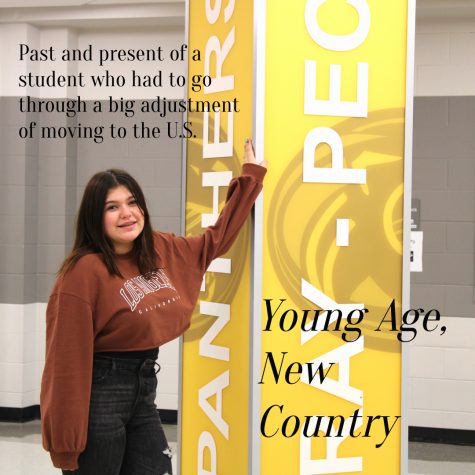A Young Age and A New Country
December 31, 2021
Moving to the United States at a young age when being inexperienced with other cultures can be difficult for a child. The adjustments needed in the situation were a large reach, especially when the person has to learn a new language and adjust to the cultural changes, particularly when the person is a kid and is apprehensive about moving there in the first place.
Freshman Antonia Baeza tells the story of her past, present and future here in the U.S. when it actually first started in her home country, Chile which is in South America.
“I think I was twelve or thirteen when I moved here. I am from Chillan, Chile. It’s near a lot of famous hispanic countries like Bolivia and Argentina. I came here because my mom decided to come here to the United States for work so I had to come here with her. Plus, my mom was an exchange student here at RayPec as a teenager, so she was still in contact with her foster family, which is why I come to this school now.” said Baeza.
When she was still in sixth grade with many friends and a lot of family around, her single mother made the big decision to come to the United States. Baeza came to the U.S. when beginning her teenage years which can be found hard since it’s a kid’s rough age, but she pushed through, although the hardest part still hasn’t begun, and was still on it’s way.

“When I left my country it was depressing even though I was a little happy. Now there’s both. I miss my family to this day. It’s hard to not see them and I also miss my friends, so I take my chance whenever I can to call my friends and family members and speak in Spanish so I don’t lose my skills in the language.” Baeza said.
Even though a big part of this journey was the decision of moving to a different continent and leaving your family, the hardest part for Baeza was learning a new and very difficult language. Especially when you have to learn it all by yourself when you are a complete Native Spanish speaker your entire life.
“Teaching myself English was hard. My mom tried to teach me how to speak English but it was complicated and I struggled, and nobody else could help me since we were in the U.S. and I didn’t know anyone who spoke Spanish. It took me four months to learn English. I learned the language by myself with no one’s help. I learned by listening to people talk in public, by reading English books, reading peoples’ emotions when speaking, and watching movies in English. I also learned a little bit by interpretation, like by thinking that some Spanish words sounded similar to English words.” said Baeza.
Coralie Price, the Spanish 1,2, and 3 teacher explains the difficulties of what Baeza had to go through. Baeza isn’t the only person who had to go through the process of needing to learn a new language after moving to a whole different country.
“I think living in a new country can be a life-changing experience for everyone. I think everyone should study or live abroad at some point. Experiencing other cultures for longer than a few days as a tourist gives you more insight into your home culture. There will be things that make you question how things are at home and also appreciate what you grew up with. However, if you don’t know the language and have to learn on the fly while you’re there, there will be more challenges than if you already know it somewhat. However, there’s also a lot more motivation to learn it quickly because you need it right now” said Price.
When Baeza moved here and learned enough English, she began to speak more and more of it and started to interact with people. Even though she started to merge into the community, some things backfired.
“Even though I spoke a little bit of English, I didn’t speak and understand enough. I think mostly people have changed my life ever since I came here; people here have made me feel more reserved, and I’m quiet and shy because ever since I was in sixth grade, because people have made fun of me. Even to this day, I am still afraid to attempt to speak English. I don’t like people hugging or touching me because I have changed a lot since people are different here. I am very conscious of talking to people, even to my mom because I feel like I’m gonna mess up again” said Baeza.
Even though she was happy to be here in the U.S. at first, she is still missing a lot of people and the Chillan culture. Here in the United States, the U.S. has its own slang and inside jokes within things that are happening in our society, while some people that are not from here don’t always understand what we mean, and for the U.S., it’s vice versa.
“It’s hard for me to fit in with people because I don’t understand slang and jokes that seem popular here. There are some racist people in the community which I hate, and they’ll always judge me for not understanding all of the common slang that is easy for Americans to understand that have been living here their whole lives.” said Baeza.
Price agrees with Baeza when it comes to different ‘sayings’ in English and how Spanish speakers don’t always understand it.
“People from different countries or regions have different accents and slang, just like English speakers around the world speak English slightly differently from each other, so it’s understandable if some Spanish speakers don’t really understand slang here,” said Price.
Even though she has a lot of fears and cons of living here in the United States, she doesn’t only have negative effects in her life. She had a few pros of being here today as well.
“Probably the biggest pro that I have for being here is school, since we have more opportunities here in America. People are also nicer in ways, but it depends who the people are. Also something else is that you can drive at an earlier age because back at home, you can’t drive until you’re eighteen.” said Baeza.
According to Baeza, Chillan, Chile is very different from the United States in many ways. Cultural differences and traditions are the main changes between these two countries. Some ordinary and normal daily places, or maybe a family’s usual holiday traditions in the U.S. are very much unlike Chile’s normal cultural life.
“Here in America, Thanksgiving is basically just for families to eat food, but for us, we don’t eat meat, or salad, so for 2 weeks we’re only allowed to eat rice and beans, which is for us to know how much we appreciate how much we have unlike other countries around us. And just like the U.S. has Fourth of July and Labor Day, we have our independence day where people make hispanic typical food, drink wine, have dance competitions, girls wear dresses, and men wear their suits.” said Baeza.
Baeza explains the differences of traditions with holidays between hispanic countries and the United States. There are different purposes and values when it comes to traditions and holidays with the diversity of Spanish countries and the United States, and Price agrees and explains the facts.
“Every Spanish-speaking country has their own culture, food, holidays, and traditions. Some are similar – like many countries celebrate 3 Kings Day on Jan. 6, which looks a lot like Christmas Eve here in the United States except kids put out their shoes for the kings (wise men) to fill with candy and presents instead of putting out stockings.” said Price.
Because of everything being so different back at home, Baeza had to adapt to her new lifestyle in a new country. Whether it was about the whole new language she just taught herself or if it was sports and activities or a new personality, she accommodated it all to her new life.
Senior Alexandra Feeback, is a friend of Baeza and explains how Baeza has done a great job with her adaptation in the community.
“In certain conversations, I, for sure, think she demonstrates different characteristics that she was more than likely accustomed to in Chile. She has done an amazing job here though. I am so proud of her. At first I didn’t even know she was originally from Chile. She fits in perfectly with everyone. While it is an adjustment, I think she is adapting well here. She does take part in some holidays but of course also still has some of her own that she and her family celebrate.” said Feeback.
Baeza is here getting a whole new perspective, as she is still adjusting to her new home. Her life story from the beginning to the present of moving to a different continent and learning one of the hardest languages to learn at such a young age, her story is an inspiration to all.



